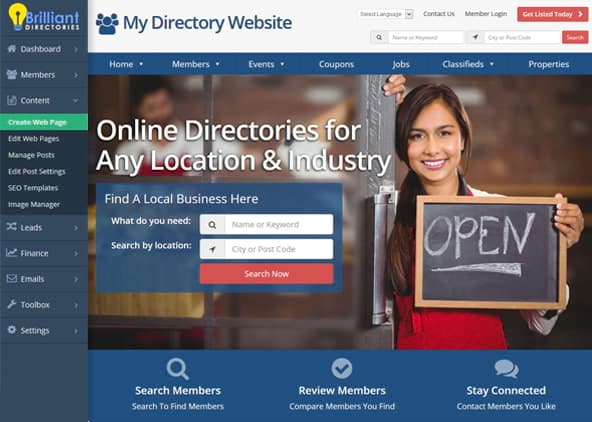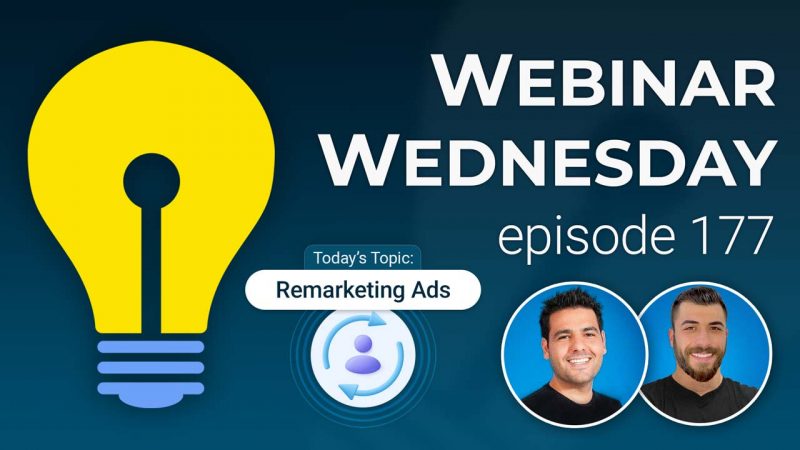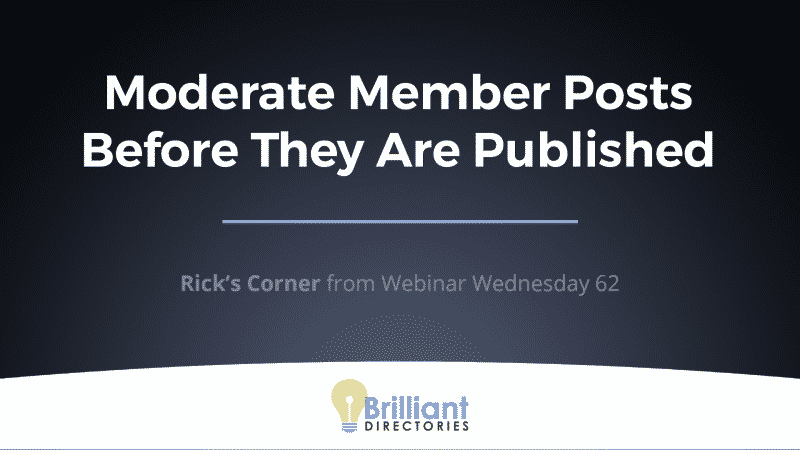
This Tip of the Week covers topics including:
- 00:00 – Introduction
- 01:50 – What Is Remarketing?
- 02:53 – Remarketing vs. Standard Advertising
- 05:31 – Remarketing Example
- 08:38 – Why Remarketing Is Important
- 11:10 – How Remarketing Works?
- 14:52 – If You Don’t Have Remarketing Ads…
- 17:06 – Remarketing: Part 2 (coming soon)
This is a segment from Webinar Wednesday 177, recorded live on April 24, 2024.

 AI-Generated Transcript – Please excuse any inaccuracies
AI-Generated Transcript – Please excuse any inaccuracies
Introduction (00:00:00)
- The importance of generating traffic to a website has been discussed in previous webinars, covering various methods such as organic and online advertising, but remarketing has not been explored in depth until now (00:00:00).
- Remarketing is a cost-effective way to get a website in front of more people and stay top of mind, and it is not too complicated, even for those unfamiliar with the term, as everyone has received remarketing ads at some point (00:00:12).
- This introduction will cover the basics of remarketing ads, including what they are, why they are important, and how they differ from traditional online advertising, with a more in-depth exploration to follow in part two (00:00:42).
- Remarketing ads are a form of targeted advertising, showing ads to people who have already visited a website, whether they found it through social media, organic search, or other means (00:01:28).
- The goal of remarketing is to bridge the gap between various marketing efforts, such as social media marketing, Google pay-per-click ads, and Facebook ads, and to continuously market to people who have visited a website (00:01:18).
What Is Remarketing? (00:01:50)
- Remarketing is a way to re-engage prospective customers who have already interacted with a website, such as visiting a specific web page, which reinforces engagement and targets users who have shown some form of interest in what the website is offering (00:01:50).
- The benefit of remarketing is that it allows websites to re-engage people who have already shown interest, whether they are general users or professionals, by displaying relevant ads to them in other places online where they are browsing the internet (00:01:54).
- Remarketing differs from standard online advertising, such as getting a paid spot in Google search results or display ads, because it focuses on a specific targeted audience of users who have already visited the website (00:02:32).
- The goal of remarketing is to re-engage these users by displaying relevant ads to them, which is made possible because the website knows they have already shown some form of interest by visiting the website (00:02:19).
- By targeting users who have already visited the website, remarketing provides a way to engage these prospective customers again, whether they are just general users or professionals who might want to register as a member or create a listing on the website (00:02:01).
- The process of remarketing involves displaying relevant ads to users in other places online where they are browsing the internet, which helps to reinforce engagement and increase the chances of converting them into customers (00:02:23).
Remarketing vs. Standard Advertising (00:02:53)
- Remarketing ads can be tailored to website visitors’ past behaviors, allowing for personalized relevance and targeted messaging, which differs from standard online marketing ads that are shown to anyone who meets certain criteria (00:03:02).
- Standard online marketing ads are typically shown to anyone who searches for a specific keyword in Google, whereas remarketing ads can be more cost-effective, with costs being pennies on the dollar compared to standard online ads (00:04:05).
- Remarketing ads target users who have already shown interest and visited a website, making them a more affordable option, with costs per click being significantly lower than standard online ads, which can cost dozens of dollars per click (00:04:28).
- Standard advertising, such as on Facebook, typically targets people based on their interests, whereas remarketing targets users who have already visited a website, allowing for more precise targeting and ad delivery based on the pages they visited (00:04:52).
- Remarketing ads can be used to deliver targeted messaging to users who have visited specific pages on a website, such as a directory website for attorneys or lawyers, allowing for more personalized and relevant advertising (00:05:16).
Remarketing Example (00:05:31)
- Remarketing ads can be used to target individuals who have visited a website, such as a directory site for attorneys in Dallas, Texas, and present them with ads on platforms like Facebook, asking if they still need a lawyer or offering to list their practice in the directory (00:05:31).
- Another example of remarketing ads is when a user visits a website, such as Coan’s, to search for a pair of shoes, and then sees an ad for the exact same pair of shoes on Facebook, which is a remarketing ad that reminds them of their interest in the product (00:06:13).
- Remarketing ads can also be used to target previous customers, such as those who have canceled their gym membership, and offer them a discount to rejoin, which is a way to re-engage with interested visitors who have previously shown interest but didn’t convert (00:06:52).
- The frequency of seeing a brand or product through remarketing ads can compel users to make a purchasing decision or sign up for something, which is why remarketing is an effective strategy (00:07:59).
- There are three main reasons why remarketing is important, including re-engaging interested visitors who have previously shown interest but didn’t convert, and the overall benefit of remarketing is to bring back visitors who have shown interest in a product or service (00:08:18).
Why Remarketing Is Important (00:08:38)
- Remarketing ads are used to re-engage website visitors and retarget them to complete a desired action, such as submitting a lead or creating a membership account, by displaying ads to them after they have visited the website (00:08:38).
- Remarketing ads can also be used for brand awareness, even if a website visitor has already converted, to keep the website top of mind and remind them of the website’s presence (00:09:03).
- Tailored messaging is another benefit of remarketing ads, as they can be personalized based on a website visitor’s past interactions to encourage action, such as delivering an ad for a specific product that the visitor viewed on the website (00:09:48).
- Remarketing ads can be a cost-effective way to boost ROI, as targeting familiar users who have already shown interest in the website’s offerings can lead to higher conversion rates and better returns on investment (00:10:16).
- The basics of remarketing involve using online ad platforms such as Google, Microsoft Bing, and Facebook, which includes Facebook and Instagram, to display ads to website visitors (00:10:47).
How Remarketing Works? (00:11:10)
- Remarketing ads can be advertised on various platforms, including Google, Bing, and Meta, which provide a pixel code that can be copied and pasted onto a website to track visitors, allowing for the delivery of targeted ads to those who have visited the website (00:11:10).
- The pixel code tracks when someone has visited a website, what pages they visited, and who hasn’t, enabling the creation of different audiences or lists of website visitors, including generic lists and more granular lists based on specific actions taken by visitors (00:11:22).
- Remarketing ads can be created to target specific audiences, such as those who visited a pricing page or a search result page, and can be delivered on platforms like Facebook, with the goal of compelling users to click and directing them to landing pages with offers or interest-generating content (00:12:07).
- The process of creating remarketing ads involves setting up a pixel code, having audience lists, and creating ads that can be delivered to those audience lists, with the aim of staying top of mind with visitors or encouraging them to return to the website to convert (00:13:29).
- Not utilizing remarketing ads can result in a potential loss of conversions, as visitors who showed initial interest by visiting a website may not return or take a desired action, highlighting the importance of remarketing ads in targeting people who have already visited a website (00:14:35).
If You Don’t Have Remarketing Ads… (00:14:52)
- Remarketing ads are used to present users with a specific action to take, such as revisiting a website and taking a desired action, by trying to re-engage with them and foster ongoing relationships and loyalty (00:14:52).
- If remarketing ads are not used, it can result in lost opportunities, and decreased brand recall, which can lead to reduced brand awareness and engagement, especially if there is no membership fee or other incentive to remember the website (00:15:07).
- Even if a user is already a member, it is still important to show them remarketing ads to stay top of mind, by presenting them with ads for content on the website, such as new articles, to keep them engaged and coming back to the website (00:15:15).
- The key things that remarketing ads can help with are staying top of mind, fostering ongoing relationships and loyalty with both converted and unconverted website visitors, and grabbing conversions by getting people to take specific actions (00:16:19).
- Remarketing ads can be used to get users to take specific actions, such as submitting a lead form, downloading an ebook, or creating a membership account, and can help to increase brand awareness and engagement (00:16:36).
Remarketing: Part 2 (coming soon) (00:17:06)
- Remarketing ad campaigns will be set up, covering popular ad platforms such as Microsoft Bing, Google, Facebook, Facebook, Messenger, and Instagram, to determine where to place the pixel code on a website (00:17:07).
- The process of setting up remarketing ads involves copying and pasting a short snippet of code provided by the platform onto the website, similar to the Google analytics snippet (00:17:18).
- Various remarketing audience lists can be created, and ideas and examples of ads for directory and membership websites will be covered, including the types of ad destination pages to include (00:17:31).
- The ad destination pages, or landing pages, should include specific key elements, such as clear calls to action and simplicity, to optimize their effectiveness (00:17:50).
- Optimizing landing pages is crucial, and the same concepts that apply to general landing page optimization also apply to remarketing ad landing pages, including keeping the design relatively simple (00:18:00).
- Remarketing ads are effective in bridging the gap between marketing efforts and continuously reaching out to people after they have visited a website (00:18:15).





![[FREE TRIALS] 4 Easy Ways to Maximize Member Sign-Ups [FREE TRIALS] 4 Easy Ways to Maximize Member Sign-Ups](https://www.brilliantdirectories.com/wp-content/uploads/2020/07/best-practices-free-membership-trials-800x450.jpg)








